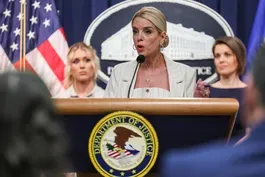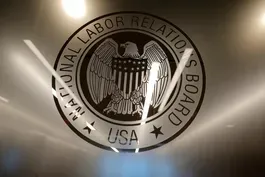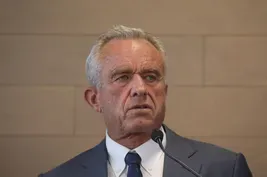
A look at the efforts to slash public media funding
Clip: 4/16/2025 | 5m 29sVideo has Closed Captions
A look at the Trump administration's efforts to slash public media funding
The Trump administration wants to cut the federal funds that support public media. It would impact NPR, PBS and the roughly 1,500 local public media stations across the country. The White House drafted a memo that could make those cuts happen soon. William Brangham reports.
Problems with Closed Captions? Closed Captioning Feedback
Problems with Closed Captions? Closed Captioning Feedback
Major corporate funding for the PBS News Hour is provided by BDO, BNSF, Consumer Cellular, American Cruise Lines, and Raymond James. Funding for the PBS NewsHour Weekend is provided by...

A look at the efforts to slash public media funding
Clip: 4/16/2025 | 5m 29sVideo has Closed Captions
The Trump administration wants to cut the federal funds that support public media. It would impact NPR, PBS and the roughly 1,500 local public media stations across the country. The White House drafted a memo that could make those cuts happen soon. William Brangham reports.
Problems with Closed Captions? Closed Captioning Feedback
How to Watch PBS News Hour
PBS News Hour is available to stream on pbs.org and the free PBS App, available on iPhone, Apple TV, Android TV, Android smartphones, Amazon Fire TV, Amazon Fire Tablet, Roku, Samsung Smart TV, and Vizio.
Providing Support for PBS.org
Learn Moreabout PBS online sponsorshipAMNA NAWAZ: As we have been reporting, the Trump administration wants to cut the federal funds that support public media in the U.S., which would impact NPR and PBS and the roughly 1,500 local public media stations across the country.
It would, of course, also affect national programs like the "News Hour."
The Trump administration has now drafted a memo that could make those cuts happen soon.
William Brangham has been following all of this and joins me now.
So, William, the administration is asking Congress to cut funds to the Corporation for Public Broadcasting.
That's a congressionally created entity through which NPR and PBS get federal funding.
What are they asking Congress to do here?
WILLIAM BRANGHAM: They're asking Congress to use a process known as rescission, which allows Congress to claw back money that has already been appropriated.
And just to back up for a second, CPB is funded on this two-year cycle.
And that's by design.
Originally, that was to insulate CPB from any political interference.
So CPB gets about 500 -- a little more than $500 million a year.
That costs about $1.50 per year per American.
And the administration wants that two-year chunk, which is about a billion dollars, immediately cut.
So that's the money that would have been appropriated for the next two fiscal years starting in this fall.
AMNA NAWAZ: So what is the process here?
How could this unfold?
WILLIAM BRANGHAM: This is part of a series of rescissions, so that the White House is asking for this money to be cut, as well as money cut from USAID and the U.S. Institute for Peace.
Procedurally, this request will go to Congress when they get back from recess at the end of the month.
That starts a 45-day period where the House and the Senate can look at this request, they can change it, approve it, deny it.
One thing to note, in the Senate, the normal filibuster rules would not apply.
So, to pass it, they would only need 51 votes.
The GOP has 53 votes in the Senate.
So, if they approve those cuts, those would happen starting in October.
AMNA NAWAZ: So if the cuts are approved and if they move forward, what have we been hearing from public media leaders about what kind of impact those cuts could have?
WILLIAM BRANGHAM: They have been saying across the board that this would be a major, major blow, especially to the large number of small rural stations that are spread all across this country.
The head of Alaska Public Media, who testified before Congress earlier this year, said, that if these cuts go through that likely most of the 26 stations spread across Alaska and all the reporters who work for them would have to close.
NPR's CEO, Katherine Maher, was on NPR today and was asked about some of this.
Here's what she had to say.
KATHERINE MAHER, CEO, NPR: We get so much value as public media by being part of a 50-state network that covers 99.7 percent of the American population.
If federal funding goes away, that network is absolutely at risk, the quality of service, the ability to cover everyone, people who live in what would otherwise be news deserts.
And as a result, there's no question that NPR would not be able to pull from that richness of our national coverage.
WILLIAM BRANGHAM: PBS' chief, Paula Kerger, she said in a statement she put out yesterday that PBS produces a lot of hugely important educational programming for children, a wide array of cultural and artistic programs.
She also said this -- quote -- "Rescinding these funds would devastate PBS member stations and the essential role they play in communities, particularly smaller and rural stations who rely on federal funding for a large portion of their budgets."
This would also impact national programs like ours, like "Frontline," like "All Things Considered," because part of that federal money goes to local stations, who then use it as fees to pay for the rights to air our programs, so impacts across the entire network.
AMNA NAWAZ: And, William, it's worth pointing out too some Republicans have long wanted to cut funding for public media.
What is this administration's argument for why they want these cuts now?
WILLIAM BRANGHAM: You're right.
Republicans have long argued that there is a liberal bias on public media, that conservative voices are excluded or marginalized.
The Trump administration makes that argument, and they also make the argument that, by covering issues like race in America, gender issues, LGBTQ issues, that public media is somehow on a campaign to change the culture of America.
Russell Vought, who is the current head of the Office of Management and Budget and was also a major author of Project 2025, here's how he described it: RUSSELL VOUGHT, Director, Office of Management and Budget: You have the $1 billion for the Corporation for Public Broadcasting, which is predominantly the NPR and PBS, which is giving us leftist news for decades and cultural indoctrination for the last four or five years.
WILLIAM BRANGHAM: We should note, PBS and NPR have consistently been rated some of the most trustworthy and reliable news sources in America.
I mean, that is from surveys of public opinion, as well as independent analyses of media bias.
And also polls have showed that the audience of public media in America does cover the full political spectrum of this country.
AMNA NAWAZ: Also worth noting, for example, on this program, we regularly invite and host conservative and Republican voices.
William Brangham, thank you so much for that.
WILLIAM BRANGHAM: Thank you.
Activist supports Sudanese sexual violence survivors
Video has Closed Captions
Activist provides support for Sudanese refugees terrorized by sexual violence (9m 7s)
Deportation challenge morphs into executive power battle
Video has Closed Captions
Challenge to Trump deportations morphs into a battle over executive and judicial power (5m 42s)
News Wrap: DOJ sues Maine over transgender athletes
Video has Closed Captions
News Wrap: DOJ sues Maine over transgender athletes (6m 7s)
NLRB whistleblower says DOGE may have caused security breach
Video has Closed Captions
NLRB whistleblower claims Musk's DOGE potentially caused significant security breach (8m 29s)
Researcher skeptical autism cause will be found by September
Video has Closed Captions
'Good science takes time': Researcher skeptical autism cause will be found by September (5m 11s)
U.S. and Iran harden positions ahead of nuclear negotiations
Video has Closed Captions
Ahead of 2nd round of nuclear negotiations, U.S. and Iran harden positions (4m 14s)
What science shows about the rise in autism diagnoses
Video has Closed Captions
What research reveals about the rise in autism diagnoses and why vaccines aren't the cause (7m 16s)
Providing Support for PBS.org
Learn Moreabout PBS online sponsorshipSupport for PBS provided by:
Major corporate funding for the PBS News Hour is provided by BDO, BNSF, Consumer Cellular, American Cruise Lines, and Raymond James. Funding for the PBS NewsHour Weekend is provided by...


















